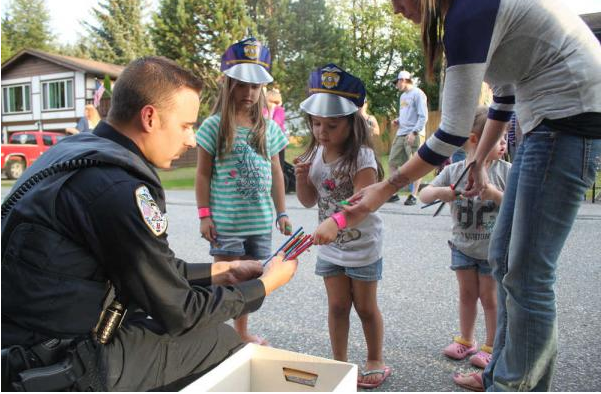Horrific videos of young men shot by police. The tragic murders of law enforcement officers in Dallas and Baton Rouge. We seem to face an unending litany of terrible news indicating a breakdown in the relationship between police and the communities that they are hired to protect. Instead of trust and support, fear seems to dominate the interactions on the street in many communities.
Here in Juneau, we think things are different. In our view, law enforcement serves us better locally because both the police and the citizens largely think of officers not as “us” and “them,” but instead as an integral part of the community. This may be in part due to our size and isolation. Not everywhere is a community of around 32,000 termed a city, and our geography ensures that our police are not going to be commuting from somewhere else.
But we think a major reason is the conscious effort of the police to embrace the philosophy and practice of community policing and outreach. We like seeing police officers walking and biking the downtown beats. They are in a position to not only know what is going on, but to also know first names and recognize faces. Officers in Juneau are better positioned to defuse situations rather than escalate confrontations. We applaud the efforts of the Juneau Police Department for reaching out through social media, inviting citizens to have coffee with a cop and holding gatherings to stand against violence and to celebrate community diversity.
[New police chief works to renew emphasis on community oriented policing]
All that said, we also admit we are viewing the situation through a tinted perspective — one that doesn’t exactly mirror the demographics of communities farther south. Moreover, we are not naïve. We are well aware that Juneau has a long history of racism, that drugs are a major problem in our community, that domestic violence is all too common and that we have unsolved murder cases stretching back decades.
In 1979, law enforcement officers Richard Adair and Jimmy Kennedy were assassinated while carrying out their jobs. We are obviously not immune from the ills of modern society.
But, it’s clear today’s efforts by JPD are helping.
Chief Bryce Johnson’s recent My Turn articulated the force’s community policing philosophy and approach. He laid out the steps that JPD will follow to help ensure the police are serving the entire community. He also challenged Juneau residents to become involved with law enforcement, to “be a community that cares.” An underlying theme to his prescriptions is that they are part of a process that requires constant self-reflection by both police and citizens, and ongoing communication between the police and all parts of our diverse community.
Along those lines, we are very impressed and supportive of the efforts of businesswoman, artist and social activist Christy NaMee Eriksen. She reached out to Chief Johnson to solicit participation in the event organized by Eriksen and fellow artist Melissa Johnson, “Racial Justice and Anti-Violence: A Creative Conversation.” This event was supported by groups and individuals from across the diverse spectrum of the Juneau community, including JPD, in an effort to bring people together to see how art can start a dialogue to address these issues.
Chief Johnson and Eriksen have shown us that we do not have to just sit back and watch the news and wish it weren’t so — they’ve shown us we can make a difference toward a better model of policing and community involvement.
Yes, here in Juneau we are unique. But we are not immune. Today we say “thank you” to our law enforcement officers for understanding the nature of our community, and for being not only our police force, but also our neighbors.
• Empire Readers’ Council editorials are written by members Joe Geldhof, Abby Lowell, Tom Rutecki, Lisa Weissler and Alex Wertheimer.
Read past Readers’ Council editorials:
Adult leadership missing in Alaska
Food sources shouldn’t be a mystery
Read more news:
Hundreds of thousands heed Juneau’s Marian Call, share #first7jobs
Former Assembly hopeful announces bid against Mary Becker
Murkowski remains undecided on whether she’ll vote for Trump

